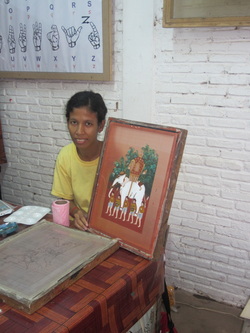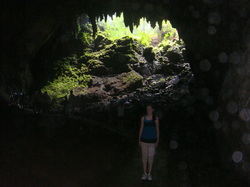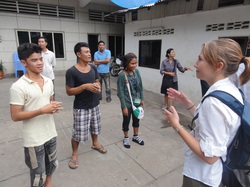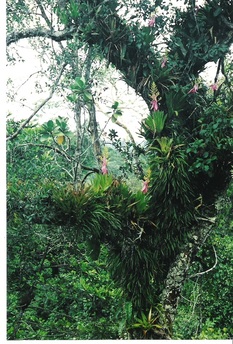
A Deaf artist in Cambodia
Purchasing souvenirs while traveling is typically a prime component of a trip, and if tourists wish to make the most responsible and ethical purchases, there are fair trade options available both domestically and abroad. On my recent trip to Cambodia this past summer, I personally supported a fair trade retailer. While touring Phnom Penh, Cambodia, I visited a market which included a shop established by a nonprofit organization called Rehab Craft Cambodia. This organization trains and hires disabled Cambodians as artisans, and also provides these individuals with business training. Since I traveled to Cambodia with an organization called Discovering Deaf Worlds to support the local Deaf community, visiting this retailer was not only an opportunity to interact with Deaf artisans at this shop, but also enabled our tour group to support fair trade as tourists. In addition to selling products in these local Cambodian shops and markets, Rehab Craft Cambodia sells their items through a fair trade, nonprofit company based in the United States called Ten Thousand Villages.
Upon returning to the United States following my trip to Cambodia, I visited a Ten Thousand Villages store after realizing their association to Rehab Craft Cambodia. The store offered a wide range of products, and the price tag on every item in the store was labeled with the country in which it was made. As I browsed throughout the store, there were several products made in Cambodia, which elicited my memories and first-hand experience at the Cambodian shop. Although I had previously recognized the significance of supporting fair trade, having the ability to associate specific individuals and faces as beneficiaries from these fair trade purchases created a deeper appreciation and desire to support fair trade. Therefore, I realized the significance of purchasing souvenirs from fair trade stores and vendors internationally, and purchasing cultural items from Ten Thousand Villages stores in the United States.
Ten Thousand Villages purchases items from artisans associated with Rehab Craft Cambodia, as well as from organizations and artisans in thirty-seven other countries in Asia, Africa, Latin American, and the Middle East. This fair trade company offers unique handmade items, such as jewelry and decor, by creating a network of “buying relationships in places where skilled artisan partners lack opportunities for stable income” (Ten Thousand Villages). The company, which was originally founded in 1946 and operated out of the founder’s trunk, has since grown to become “one of the world’s largest fair trade organizations” with three hundred and eighty stores and vendors across the United States (Ten Thousand Villages). As a nonprofit company, they are dedicated to supporting and improving the lives of underprivileged individuals in developing countries through their fair trade principles “to meet the ‘triple bottom line‘ of economic, environmental and social sustainability” (Ten Thousand Villages). Due to their commitment to fulfill the cornerstones of fair trade, Ten Thousand Villages has been recognized as “a founding member of the World Fair Trade Organization (WFTO)” (Ten Thousand Villages).
The following details how Ten Thousand Villages satisfies the five cornerstones of fair trade.
(2012). Ten Thousand Villages. Retrieved from http://tenthousandvillages.com/
Upon returning to the United States following my trip to Cambodia, I visited a Ten Thousand Villages store after realizing their association to Rehab Craft Cambodia. The store offered a wide range of products, and the price tag on every item in the store was labeled with the country in which it was made. As I browsed throughout the store, there were several products made in Cambodia, which elicited my memories and first-hand experience at the Cambodian shop. Although I had previously recognized the significance of supporting fair trade, having the ability to associate specific individuals and faces as beneficiaries from these fair trade purchases created a deeper appreciation and desire to support fair trade. Therefore, I realized the significance of purchasing souvenirs from fair trade stores and vendors internationally, and purchasing cultural items from Ten Thousand Villages stores in the United States.
Ten Thousand Villages purchases items from artisans associated with Rehab Craft Cambodia, as well as from organizations and artisans in thirty-seven other countries in Asia, Africa, Latin American, and the Middle East. This fair trade company offers unique handmade items, such as jewelry and decor, by creating a network of “buying relationships in places where skilled artisan partners lack opportunities for stable income” (Ten Thousand Villages). The company, which was originally founded in 1946 and operated out of the founder’s trunk, has since grown to become “one of the world’s largest fair trade organizations” with three hundred and eighty stores and vendors across the United States (Ten Thousand Villages). As a nonprofit company, they are dedicated to supporting and improving the lives of underprivileged individuals in developing countries through their fair trade principles “to meet the ‘triple bottom line‘ of economic, environmental and social sustainability” (Ten Thousand Villages). Due to their commitment to fulfill the cornerstones of fair trade, Ten Thousand Villages has been recognized as “a founding member of the World Fair Trade Organization (WFTO)” (Ten Thousand Villages).
The following details how Ten Thousand Villages satisfies the five cornerstones of fair trade.
- Fair Working Conditions:Ten Thousand Villages provides fair working conditions, in part by hiring local underemployed and unemployed individuals. By doing so, these individuals have the opportunity to earn fair income to improve their livelihood by selling hand-made products as artisans. As will be discussed in the proceeding section on fair prices, all artisans are compensated fairly for their work and materials, which contributes to their ethical working conditions. In addition, Ten Thousand Villages is a nonprofit organization; therefore any revenue or excess profits received will be maintained within the company “to increase purchases from artisans and to finance the growth of Ten Thousand Villages retail network” (Ten Thousand Villages). This means that Ten Thousand Villages does not make a personal profit, but rather uses any financial resources to further benefit the international artisans around the world. This company is also dedicated to building long-term relationships with artisans and organizations to best benefit the workers. Ten Thousand Villages strives to maintain consistency in regards to the amount of products purchased annually from artisans so that these workers have a dependable income to improve their lives and develop their business. As a testament to their fair working conditions and business practices, Ten Thousand Villages was recognized as “one of the ‘World’s Most Ethical Companies’ by the Ethisphere Institute and Forbes Magazine 2008-2010” (Ten Thousand Villages).
- Fair Prices:Fair pricing is a prime value of this company, and they abide by certain procedures to ensure this practice. The artisans are provided with “up to 50 percent in cash advances when an order is placed, and payment in full when an order is shipped” (Ten Thousand Villages). By doing so, artisans have the ability to buy any necessary equipment and materials without succumbing to debt or relying on high-interest loans. Ten Thousand Villages takes the responsibility of marketing the items in the United States, and because the artisans receive payment prior to sending their products to the warehouse, the artisans’ wages are not impacted by markdown prices. “Ten Thousand Villages buyers and staff” determine fair prices with the artisans “based on the cost of materials, and a fair wage for the production time and skill level required to make each product” (Ten Thousand Villages). Providing fair prices verifies that artisans are ethically compensated for their time and materials cost, allowing them the ability to satisfy their basic needs.
- Integration Into the Local Economy and Regional Development: Ten Thousand Villages is committed to supporting the artisans’ local economies and regional development. By providing employment opportunities for those who may have no other means for income assists in developing the economy and improves the livelihood for individuals in the thirty-eight countries that Ten Thousand Villages supports. Due to the manner in which this company handles business with its artisans, long-term relationship are formed, which establishes a sustainable market that can continue to support these individuals and areas. Through fair trade, these artisans can use their income for food, education, housing, and healthcare, which provides more opportunities to develop their lives and communities. This company also works with the organizations and artisans to determine the best manner in which to construct and design their products to further advance their business. Artisans are encouraged to use local materials to further support the local economy and to design their products that appeals most to customers, namely Americans. Through these practices, the artisans have greater potential to earn more and organizations can hire new artisans in need of employment.
- Fair Trade Partnerships Between All Actors in Tourism: As a company, Ten Thousand Villages is a role model for fair trade (in tourism) which is justified by their Longtime Leadership Award in 2006. They are committed to building fair trade partnerships for all those involved in the tourism industry. Instead of exclusively selling items through Ten Thousand Villages, the organizations and artisans have the opportunity to sell their products in local shops and vendors for international tourists to purchase. However, domestic tourist or even local residents who wish to support fair trade in the United States also have this option through the Ten Thousand Villages sales outlets. Considering the principles which provide the basis for maintaining this fair trade company, the local people of the countries who supply the products clearly benefit from the business. Tourists can also benefit, especially if they are seeking fair trade souvenirs or realize the importance of purchasing fair trade items through one of these Ten Thousand Villages outlets (internationally or in the United States). Ten Thousand Villages also works with the artisans to create products and designs that will most appeal to the customer base, which is largely comprised of American tourists. This will create a greater desire for customers to purchase the fair trade items and allow the local artisans, businesses, and economy to further expand, develop, and benefit.
- Sustainable Resource Use and Environmental Justice: Ten Thousand Villages has demonstrated their commitment to environmental sustainability and justice through their personal business practices as well as encouraging their international artisans to do the same. This company has emphasized the value of minimizing their carbon footprint by maintaining sustainable buildings and practices. Retail outlets are all constructed with “recycled flooring, environmentally safe paints, recycled fixtures and efficient lighting” (Ten Thousand Villages). This company also uses recycled and natural materials whenever possible, which includes printing promotional materials on recycled paper and using their website as an a sustainable alternative to catalogs. To reduce their fuel use and pollution, Ten Thousand Villages relies on sea shipments as much as possible and additionally consolidates their shipments. UPS is then utilized for ground deliveries, which is a sustainable option due to their use of “compressed natural gas, liquefied natural gas, propane, electricity and hydrogen” (Ten Thousand Villages). As a result of their dedication to environmental sustainability, Ten Thousand Villages received with the Co-op America Award for Green Business of the Year in 2005. The artisans abroad are also encouraged to use environmental practices by utilizing natural and recycled materials for the construction of their hand-made products. Artisans use recyclable items such as newspapers, magazines, glass, and sustainable wood (“from farms that replant trees after they are harvested”) to make unique and practical products. In addition, natural materials such as bamboo, water weeds, local raw materials, and natural dies are incorporated into the artisans’ work. Whenever possible, Ten Thousand Villages urges artisans to implement sustainable practices and use environmentally friendly materials.
(2012). Ten Thousand Villages. Retrieved from http://tenthousandvillages.com/




 RSS Feed
RSS Feed